Social Responsibility of Business: A Critical Essay for BUS3001
VerifiedAdded on 2022/12/30
|12
|3891
|29
Essay
AI Summary
This essay examines the social responsibility of businesses, focusing on ethical considerations and corporate scandals, particularly those involving companies like Marks & Spencer and Tesco. It explores the impact of ethical breaches, such as the 'Sweatshop scandal,' and the role of business schools in instilling ethical values. The essay also discusses whistleblowing, its theories, and its practical implications, providing examples of internal and external whistleblowing and their consequences. Furthermore, the essay highlights the importance of ethical leadership and the need for management schools to integrate ethics into their curriculum. It also covers the Whistle Blowers Protection Act and the two main theories related to whistleblowing. The essay concludes by emphasizing the significance of corporate social responsibility in the modern business environment.
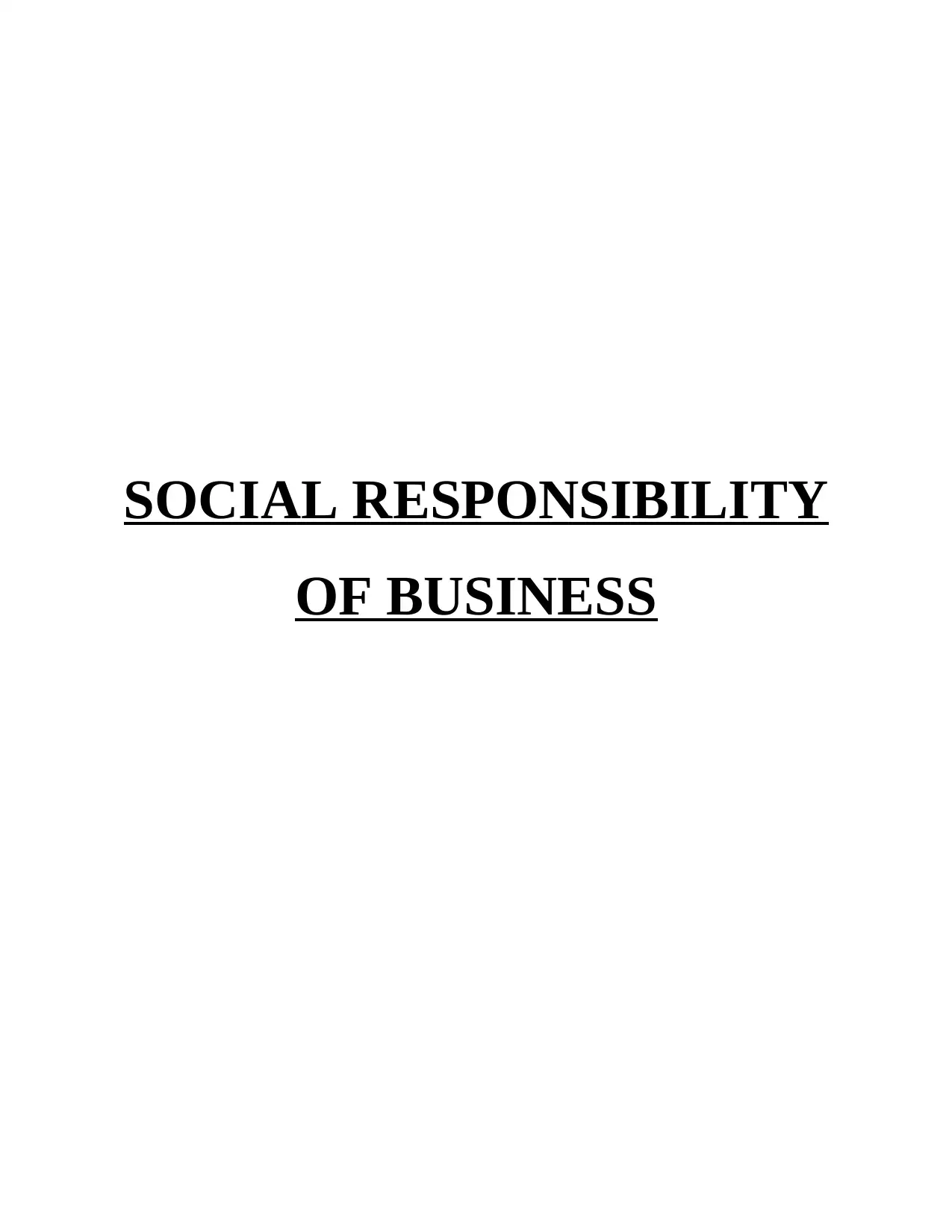
SOCIAL RESPONSIBILITY
OF BUSINESS
OF BUSINESS
Paraphrase This Document
Need a fresh take? Get an instant paraphrase of this document with our AI Paraphraser
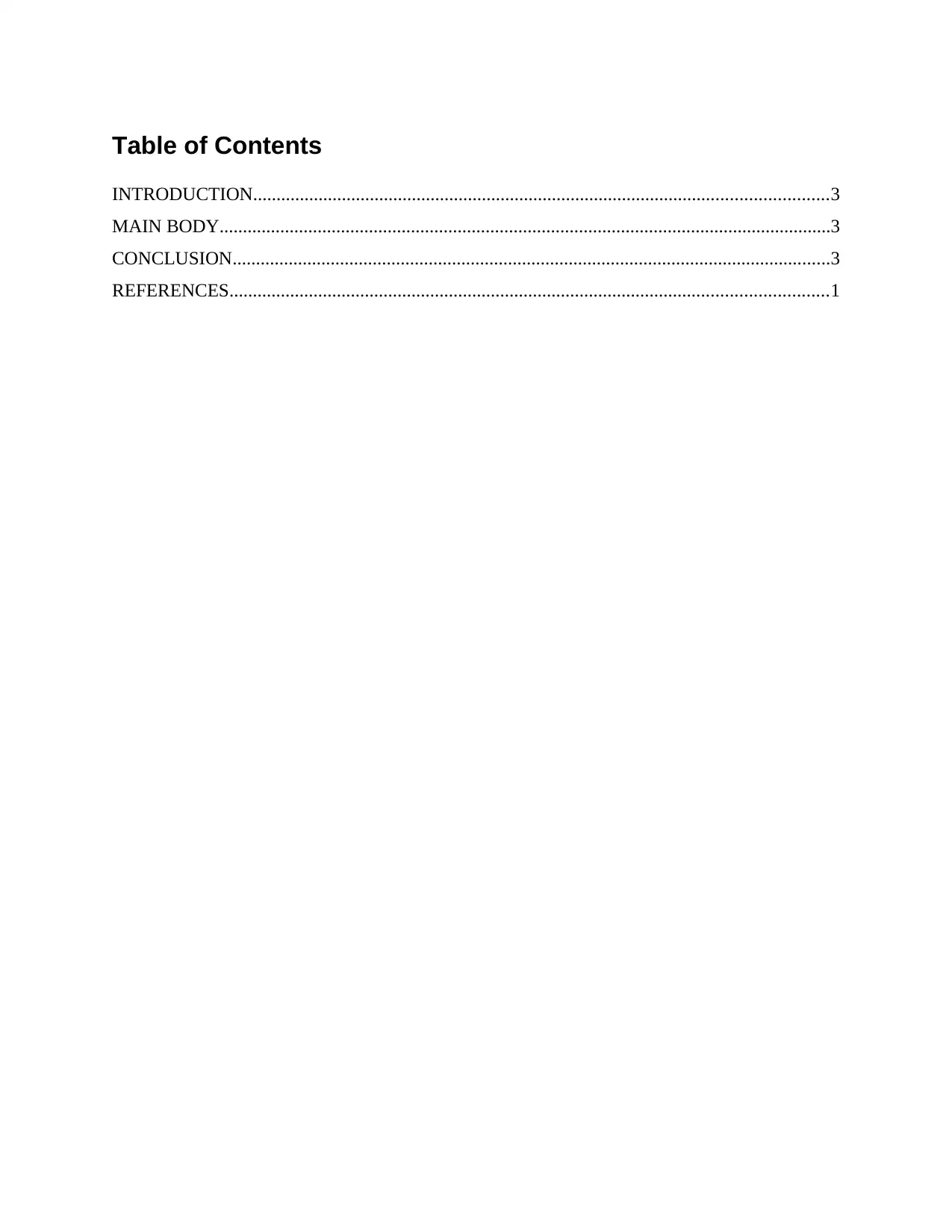
Table of Contents
INTRODUCTION...........................................................................................................................3
MAIN BODY...................................................................................................................................3
CONCLUSION................................................................................................................................3
REFERENCES................................................................................................................................1
INTRODUCTION...........................................................................................................................3
MAIN BODY...................................................................................................................................3
CONCLUSION................................................................................................................................3
REFERENCES................................................................................................................................1
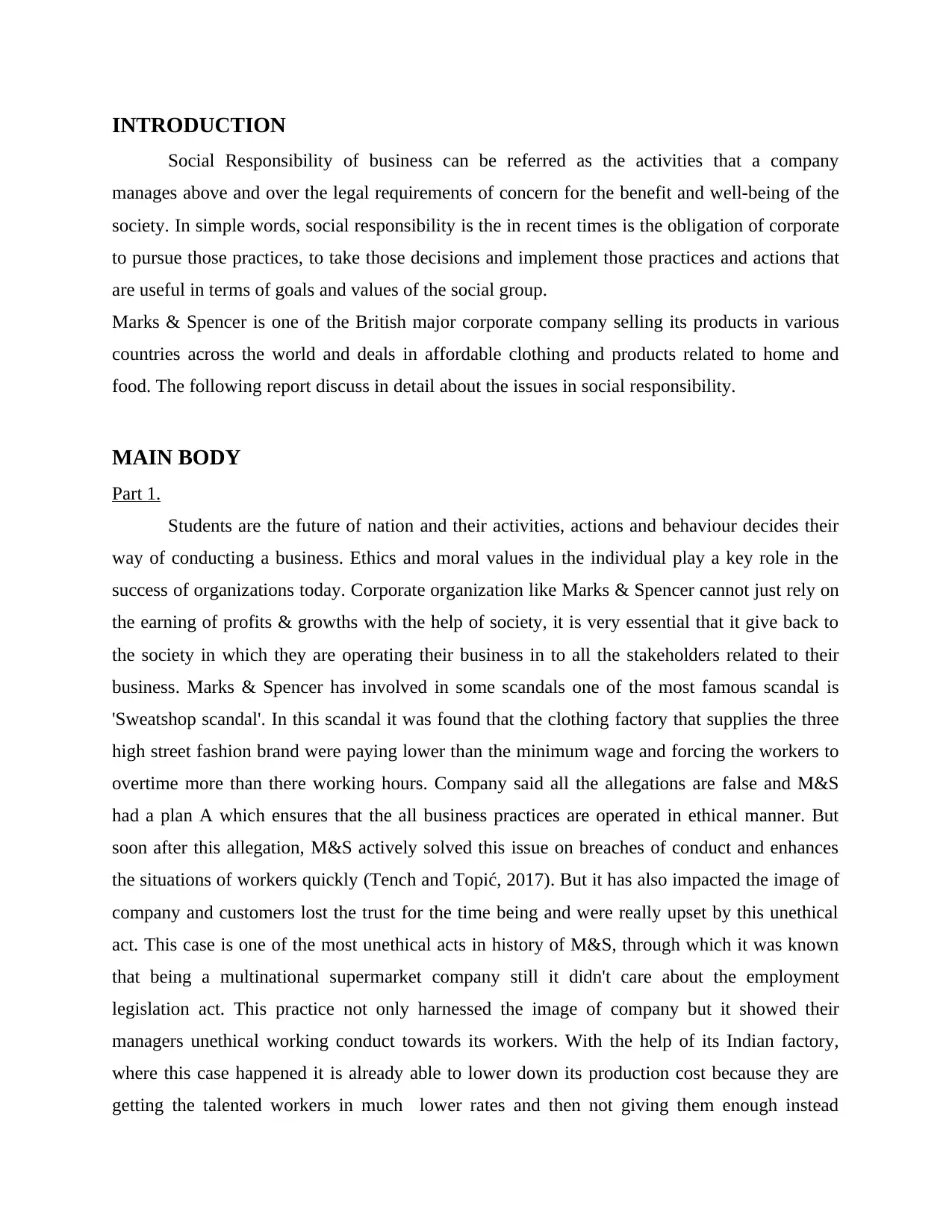
INTRODUCTION
Social Responsibility of business can be referred as the activities that a company
manages above and over the legal requirements of concern for the benefit and well-being of the
society. In simple words, social responsibility is the in recent times is the obligation of corporate
to pursue those practices, to take those decisions and implement those practices and actions that
are useful in terms of goals and values of the social group.
Marks & Spencer is one of the British major corporate company selling its products in various
countries across the world and deals in affordable clothing and products related to home and
food. The following report discuss in detail about the issues in social responsibility.
MAIN BODY
Part 1.
Students are the future of nation and their activities, actions and behaviour decides their
way of conducting a business. Ethics and moral values in the individual play a key role in the
success of organizations today. Corporate organization like Marks & Spencer cannot just rely on
the earning of profits & growths with the help of society, it is very essential that it give back to
the society in which they are operating their business in to all the stakeholders related to their
business. Marks & Spencer has involved in some scandals one of the most famous scandal is
'Sweatshop scandal'. In this scandal it was found that the clothing factory that supplies the three
high street fashion brand were paying lower than the minimum wage and forcing the workers to
overtime more than there working hours. Company said all the allegations are false and M&S
had a plan A which ensures that the all business practices are operated in ethical manner. But
soon after this allegation, M&S actively solved this issue on breaches of conduct and enhances
the situations of workers quickly (Tench and Topić, 2017). But it has also impacted the image of
company and customers lost the trust for the time being and were really upset by this unethical
act. This case is one of the most unethical acts in history of M&S, through which it was known
that being a multinational supermarket company still it didn't care about the employment
legislation act. This practice not only harnessed the image of company but it showed their
managers unethical working conduct towards its workers. With the help of its Indian factory,
where this case happened it is already able to lower down its production cost because they are
getting the talented workers in much lower rates and then not giving them enough instead
Social Responsibility of business can be referred as the activities that a company
manages above and over the legal requirements of concern for the benefit and well-being of the
society. In simple words, social responsibility is the in recent times is the obligation of corporate
to pursue those practices, to take those decisions and implement those practices and actions that
are useful in terms of goals and values of the social group.
Marks & Spencer is one of the British major corporate company selling its products in various
countries across the world and deals in affordable clothing and products related to home and
food. The following report discuss in detail about the issues in social responsibility.
MAIN BODY
Part 1.
Students are the future of nation and their activities, actions and behaviour decides their
way of conducting a business. Ethics and moral values in the individual play a key role in the
success of organizations today. Corporate organization like Marks & Spencer cannot just rely on
the earning of profits & growths with the help of society, it is very essential that it give back to
the society in which they are operating their business in to all the stakeholders related to their
business. Marks & Spencer has involved in some scandals one of the most famous scandal is
'Sweatshop scandal'. In this scandal it was found that the clothing factory that supplies the three
high street fashion brand were paying lower than the minimum wage and forcing the workers to
overtime more than there working hours. Company said all the allegations are false and M&S
had a plan A which ensures that the all business practices are operated in ethical manner. But
soon after this allegation, M&S actively solved this issue on breaches of conduct and enhances
the situations of workers quickly (Tench and Topić, 2017). But it has also impacted the image of
company and customers lost the trust for the time being and were really upset by this unethical
act. This case is one of the most unethical acts in history of M&S, through which it was known
that being a multinational supermarket company still it didn't care about the employment
legislation act. This practice not only harnessed the image of company but it showed their
managers unethical working conduct towards its workers. With the help of its Indian factory,
where this case happened it is already able to lower down its production cost because they are
getting the talented workers in much lower rates and then not giving them enough instead
⊘ This is a preview!⊘
Do you want full access?
Subscribe today to unlock all pages.

Trusted by 1+ million students worldwide
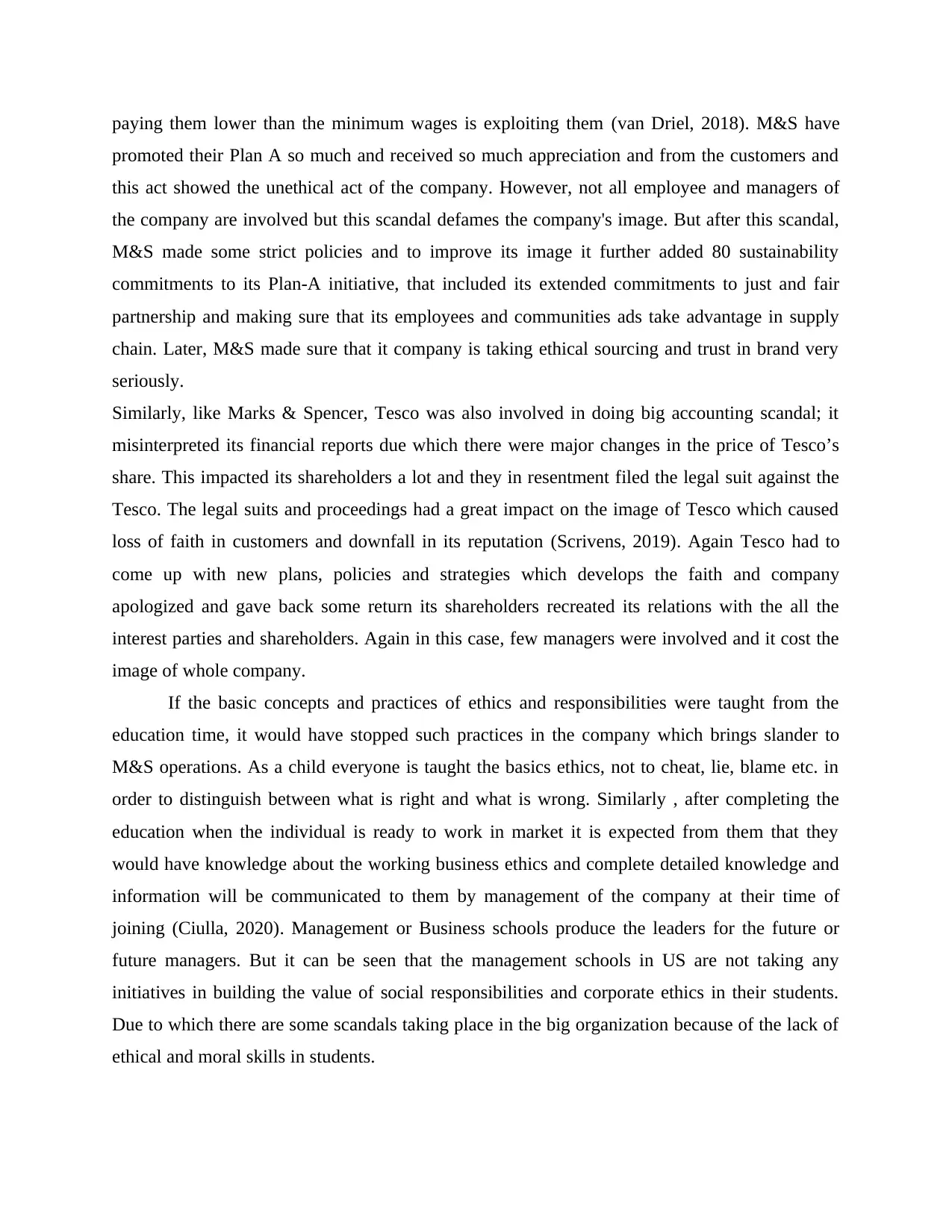
paying them lower than the minimum wages is exploiting them (van Driel, 2018). M&S have
promoted their Plan A so much and received so much appreciation and from the customers and
this act showed the unethical act of the company. However, not all employee and managers of
the company are involved but this scandal defames the company's image. But after this scandal,
M&S made some strict policies and to improve its image it further added 80 sustainability
commitments to its Plan-A initiative, that included its extended commitments to just and fair
partnership and making sure that its employees and communities ads take advantage in supply
chain. Later, M&S made sure that it company is taking ethical sourcing and trust in brand very
seriously.
Similarly, like Marks & Spencer, Tesco was also involved in doing big accounting scandal; it
misinterpreted its financial reports due which there were major changes in the price of Tesco’s
share. This impacted its shareholders a lot and they in resentment filed the legal suit against the
Tesco. The legal suits and proceedings had a great impact on the image of Tesco which caused
loss of faith in customers and downfall in its reputation (Scrivens, 2019). Again Tesco had to
come up with new plans, policies and strategies which develops the faith and company
apologized and gave back some return its shareholders recreated its relations with the all the
interest parties and shareholders. Again in this case, few managers were involved and it cost the
image of whole company.
If the basic concepts and practices of ethics and responsibilities were taught from the
education time, it would have stopped such practices in the company which brings slander to
M&S operations. As a child everyone is taught the basics ethics, not to cheat, lie, blame etc. in
order to distinguish between what is right and what is wrong. Similarly , after completing the
education when the individual is ready to work in market it is expected from them that they
would have knowledge about the working business ethics and complete detailed knowledge and
information will be communicated to them by management of the company at their time of
joining (Ciulla, 2020). Management or Business schools produce the leaders for the future or
future managers. But it can be seen that the management schools in US are not taking any
initiatives in building the value of social responsibilities and corporate ethics in their students.
Due to which there are some scandals taking place in the big organization because of the lack of
ethical and moral skills in students.
promoted their Plan A so much and received so much appreciation and from the customers and
this act showed the unethical act of the company. However, not all employee and managers of
the company are involved but this scandal defames the company's image. But after this scandal,
M&S made some strict policies and to improve its image it further added 80 sustainability
commitments to its Plan-A initiative, that included its extended commitments to just and fair
partnership and making sure that its employees and communities ads take advantage in supply
chain. Later, M&S made sure that it company is taking ethical sourcing and trust in brand very
seriously.
Similarly, like Marks & Spencer, Tesco was also involved in doing big accounting scandal; it
misinterpreted its financial reports due which there were major changes in the price of Tesco’s
share. This impacted its shareholders a lot and they in resentment filed the legal suit against the
Tesco. The legal suits and proceedings had a great impact on the image of Tesco which caused
loss of faith in customers and downfall in its reputation (Scrivens, 2019). Again Tesco had to
come up with new plans, policies and strategies which develops the faith and company
apologized and gave back some return its shareholders recreated its relations with the all the
interest parties and shareholders. Again in this case, few managers were involved and it cost the
image of whole company.
If the basic concepts and practices of ethics and responsibilities were taught from the
education time, it would have stopped such practices in the company which brings slander to
M&S operations. As a child everyone is taught the basics ethics, not to cheat, lie, blame etc. in
order to distinguish between what is right and what is wrong. Similarly , after completing the
education when the individual is ready to work in market it is expected from them that they
would have knowledge about the working business ethics and complete detailed knowledge and
information will be communicated to them by management of the company at their time of
joining (Ciulla, 2020). Management or Business schools produce the leaders for the future or
future managers. But it can be seen that the management schools in US are not taking any
initiatives in building the value of social responsibilities and corporate ethics in their students.
Due to which there are some scandals taking place in the big organization because of the lack of
ethical and moral skills in students.
Paraphrase This Document
Need a fresh take? Get an instant paraphrase of this document with our AI Paraphraser
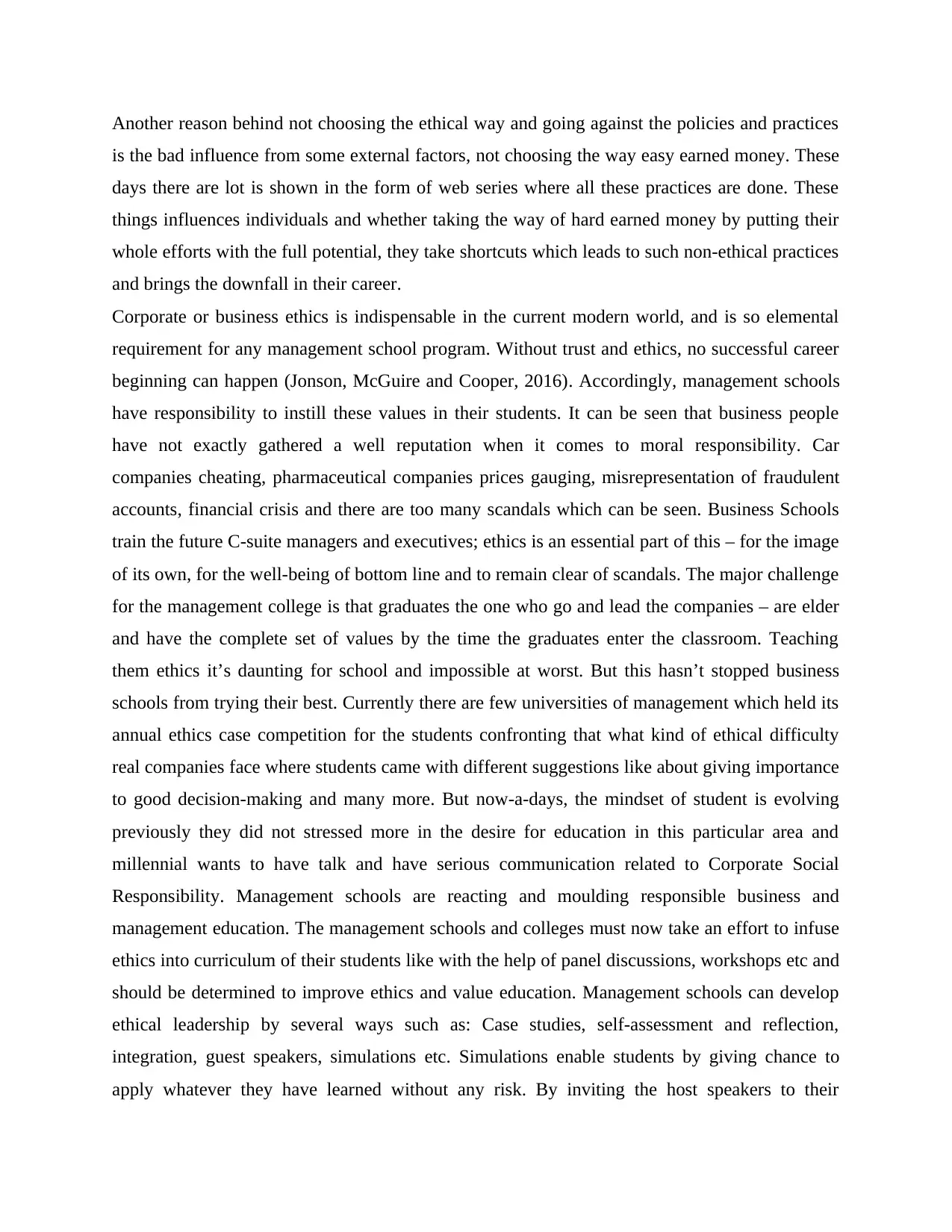
Another reason behind not choosing the ethical way and going against the policies and practices
is the bad influence from some external factors, not choosing the way easy earned money. These
days there are lot is shown in the form of web series where all these practices are done. These
things influences individuals and whether taking the way of hard earned money by putting their
whole efforts with the full potential, they take shortcuts which leads to such non-ethical practices
and brings the downfall in their career.
Corporate or business ethics is indispensable in the current modern world, and is so elemental
requirement for any management school program. Without trust and ethics, no successful career
beginning can happen (Jonson, McGuire and Cooper, 2016). Accordingly, management schools
have responsibility to instill these values in their students. It can be seen that business people
have not exactly gathered a well reputation when it comes to moral responsibility. Car
companies cheating, pharmaceutical companies prices gauging, misrepresentation of fraudulent
accounts, financial crisis and there are too many scandals which can be seen. Business Schools
train the future C-suite managers and executives; ethics is an essential part of this – for the image
of its own, for the well-being of bottom line and to remain clear of scandals. The major challenge
for the management college is that graduates the one who go and lead the companies – are elder
and have the complete set of values by the time the graduates enter the classroom. Teaching
them ethics it’s daunting for school and impossible at worst. But this hasn’t stopped business
schools from trying their best. Currently there are few universities of management which held its
annual ethics case competition for the students confronting that what kind of ethical difficulty
real companies face where students came with different suggestions like about giving importance
to good decision-making and many more. But now-a-days, the mindset of student is evolving
previously they did not stressed more in the desire for education in this particular area and
millennial wants to have talk and have serious communication related to Corporate Social
Responsibility. Management schools are reacting and moulding responsible business and
management education. The management schools and colleges must now take an effort to infuse
ethics into curriculum of their students like with the help of panel discussions, workshops etc and
should be determined to improve ethics and value education. Management schools can develop
ethical leadership by several ways such as: Case studies, self-assessment and reflection,
integration, guest speakers, simulations etc. Simulations enable students by giving chance to
apply whatever they have learned without any risk. By inviting the host speakers to their
is the bad influence from some external factors, not choosing the way easy earned money. These
days there are lot is shown in the form of web series where all these practices are done. These
things influences individuals and whether taking the way of hard earned money by putting their
whole efforts with the full potential, they take shortcuts which leads to such non-ethical practices
and brings the downfall in their career.
Corporate or business ethics is indispensable in the current modern world, and is so elemental
requirement for any management school program. Without trust and ethics, no successful career
beginning can happen (Jonson, McGuire and Cooper, 2016). Accordingly, management schools
have responsibility to instill these values in their students. It can be seen that business people
have not exactly gathered a well reputation when it comes to moral responsibility. Car
companies cheating, pharmaceutical companies prices gauging, misrepresentation of fraudulent
accounts, financial crisis and there are too many scandals which can be seen. Business Schools
train the future C-suite managers and executives; ethics is an essential part of this – for the image
of its own, for the well-being of bottom line and to remain clear of scandals. The major challenge
for the management college is that graduates the one who go and lead the companies – are elder
and have the complete set of values by the time the graduates enter the classroom. Teaching
them ethics it’s daunting for school and impossible at worst. But this hasn’t stopped business
schools from trying their best. Currently there are few universities of management which held its
annual ethics case competition for the students confronting that what kind of ethical difficulty
real companies face where students came with different suggestions like about giving importance
to good decision-making and many more. But now-a-days, the mindset of student is evolving
previously they did not stressed more in the desire for education in this particular area and
millennial wants to have talk and have serious communication related to Corporate Social
Responsibility. Management schools are reacting and moulding responsible business and
management education. The management schools and colleges must now take an effort to infuse
ethics into curriculum of their students like with the help of panel discussions, workshops etc and
should be determined to improve ethics and value education. Management schools can develop
ethical leadership by several ways such as: Case studies, self-assessment and reflection,
integration, guest speakers, simulations etc. Simulations enable students by giving chance to
apply whatever they have learned without any risk. By inviting the host speakers to their
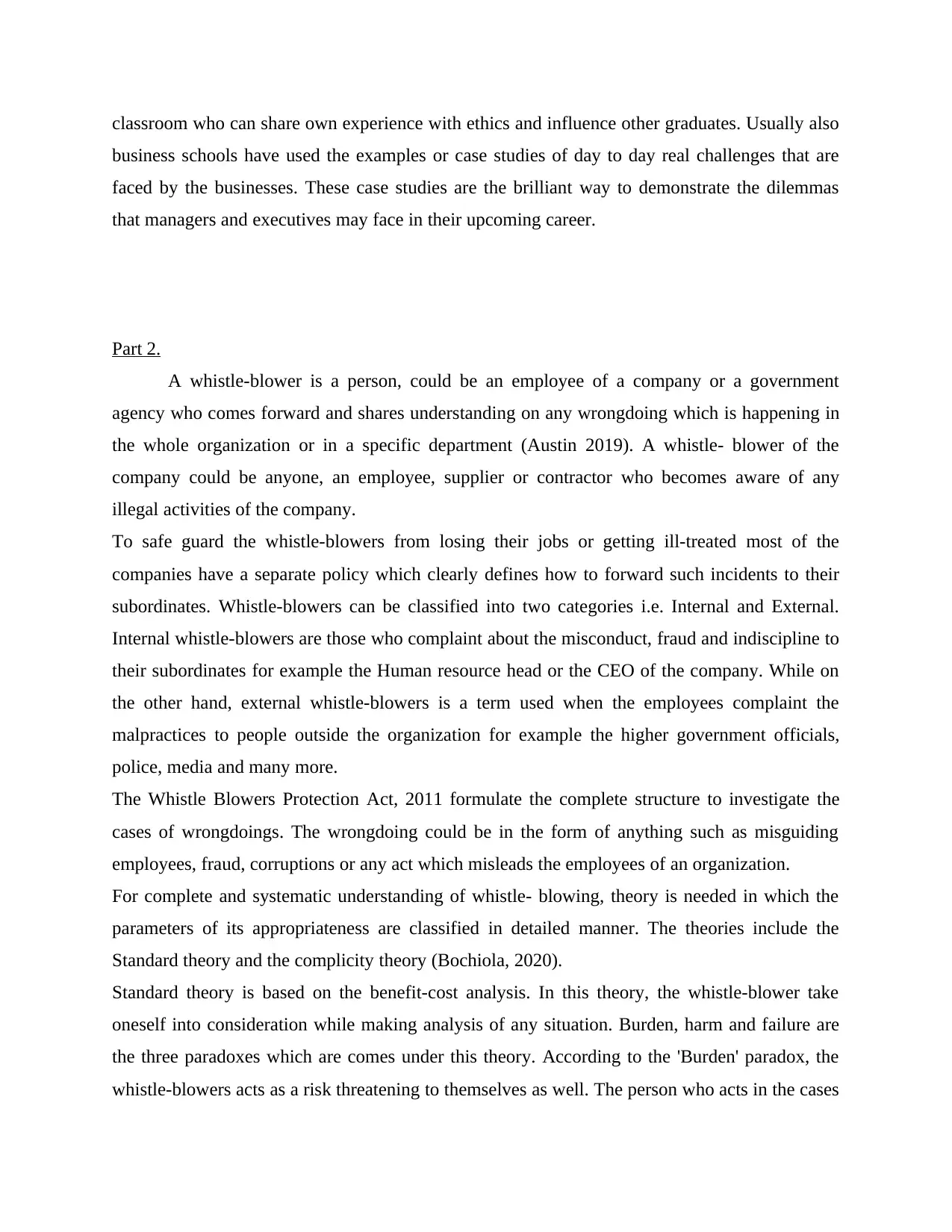
classroom who can share own experience with ethics and influence other graduates. Usually also
business schools have used the examples or case studies of day to day real challenges that are
faced by the businesses. These case studies are the brilliant way to demonstrate the dilemmas
that managers and executives may face in their upcoming career.
Part 2.
A whistle-blower is a person, could be an employee of a company or a government
agency who comes forward and shares understanding on any wrongdoing which is happening in
the whole organization or in a specific department (Austin 2019). A whistle- blower of the
company could be anyone, an employee, supplier or contractor who becomes aware of any
illegal activities of the company.
To safe guard the whistle-blowers from losing their jobs or getting ill-treated most of the
companies have a separate policy which clearly defines how to forward such incidents to their
subordinates. Whistle-blowers can be classified into two categories i.e. Internal and External.
Internal whistle-blowers are those who complaint about the misconduct, fraud and indiscipline to
their subordinates for example the Human resource head or the CEO of the company. While on
the other hand, external whistle-blowers is a term used when the employees complaint the
malpractices to people outside the organization for example the higher government officials,
police, media and many more.
The Whistle Blowers Protection Act, 2011 formulate the complete structure to investigate the
cases of wrongdoings. The wrongdoing could be in the form of anything such as misguiding
employees, fraud, corruptions or any act which misleads the employees of an organization.
For complete and systematic understanding of whistle- blowing, theory is needed in which the
parameters of its appropriateness are classified in detailed manner. The theories include the
Standard theory and the complicity theory (Bochiola, 2020).
Standard theory is based on the benefit-cost analysis. In this theory, the whistle-blower take
oneself into consideration while making analysis of any situation. Burden, harm and failure are
the three paradoxes which are comes under this theory. According to the 'Burden' paradox, the
whistle-blowers acts as a risk threatening to themselves as well. The person who acts in the cases
business schools have used the examples or case studies of day to day real challenges that are
faced by the businesses. These case studies are the brilliant way to demonstrate the dilemmas
that managers and executives may face in their upcoming career.
Part 2.
A whistle-blower is a person, could be an employee of a company or a government
agency who comes forward and shares understanding on any wrongdoing which is happening in
the whole organization or in a specific department (Austin 2019). A whistle- blower of the
company could be anyone, an employee, supplier or contractor who becomes aware of any
illegal activities of the company.
To safe guard the whistle-blowers from losing their jobs or getting ill-treated most of the
companies have a separate policy which clearly defines how to forward such incidents to their
subordinates. Whistle-blowers can be classified into two categories i.e. Internal and External.
Internal whistle-blowers are those who complaint about the misconduct, fraud and indiscipline to
their subordinates for example the Human resource head or the CEO of the company. While on
the other hand, external whistle-blowers is a term used when the employees complaint the
malpractices to people outside the organization for example the higher government officials,
police, media and many more.
The Whistle Blowers Protection Act, 2011 formulate the complete structure to investigate the
cases of wrongdoings. The wrongdoing could be in the form of anything such as misguiding
employees, fraud, corruptions or any act which misleads the employees of an organization.
For complete and systematic understanding of whistle- blowing, theory is needed in which the
parameters of its appropriateness are classified in detailed manner. The theories include the
Standard theory and the complicity theory (Bochiola, 2020).
Standard theory is based on the benefit-cost analysis. In this theory, the whistle-blower take
oneself into consideration while making analysis of any situation. Burden, harm and failure are
the three paradoxes which are comes under this theory. According to the 'Burden' paradox, the
whistle-blowers acts as a risk threatening to themselves as well. The person who acts in the cases
⊘ This is a preview!⊘
Do you want full access?
Subscribe today to unlock all pages.

Trusted by 1+ million students worldwide
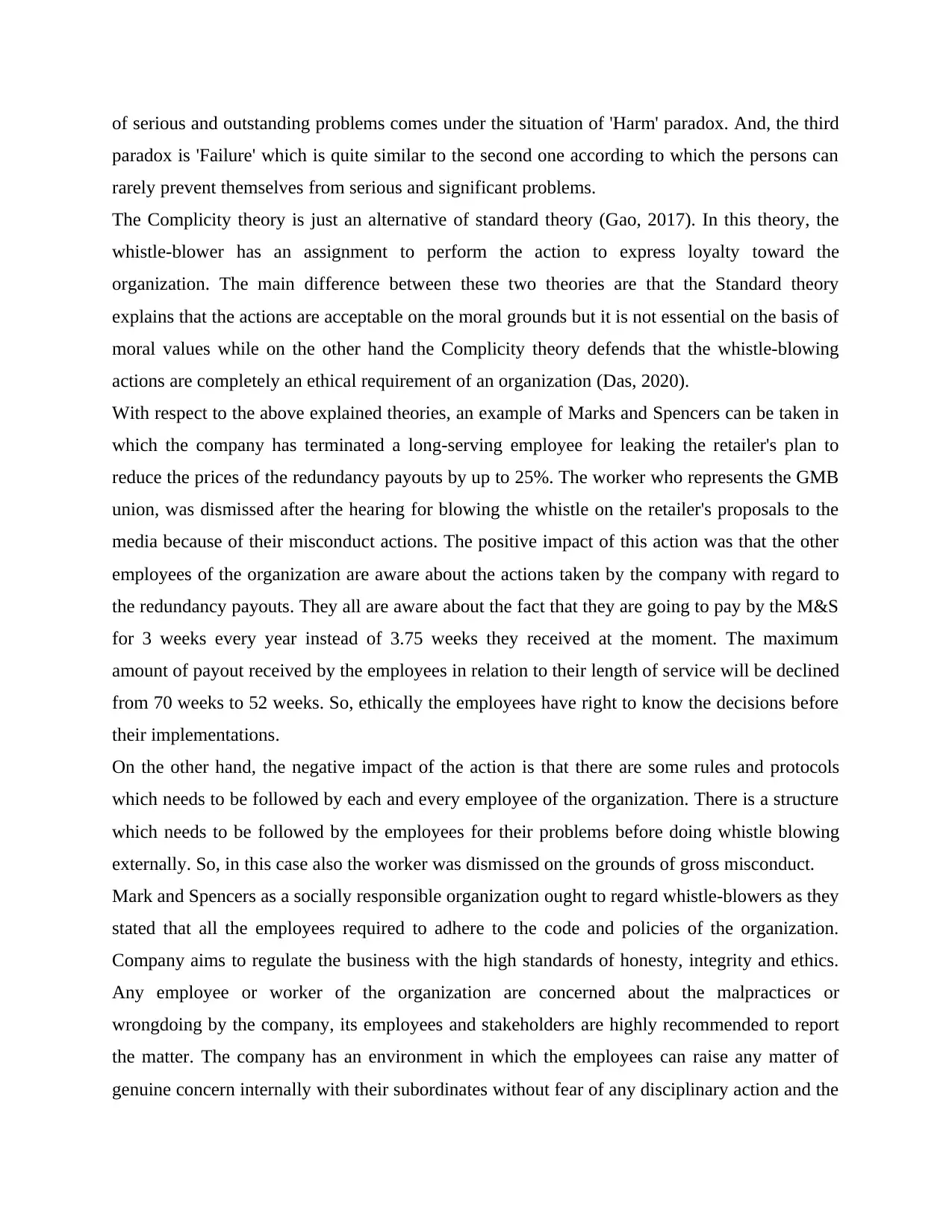
of serious and outstanding problems comes under the situation of 'Harm' paradox. And, the third
paradox is 'Failure' which is quite similar to the second one according to which the persons can
rarely prevent themselves from serious and significant problems.
The Complicity theory is just an alternative of standard theory (Gao, 2017). In this theory, the
whistle-blower has an assignment to perform the action to express loyalty toward the
organization. The main difference between these two theories are that the Standard theory
explains that the actions are acceptable on the moral grounds but it is not essential on the basis of
moral values while on the other hand the Complicity theory defends that the whistle-blowing
actions are completely an ethical requirement of an organization (Das, 2020).
With respect to the above explained theories, an example of Marks and Spencers can be taken in
which the company has terminated a long-serving employee for leaking the retailer's plan to
reduce the prices of the redundancy payouts by up to 25%. The worker who represents the GMB
union, was dismissed after the hearing for blowing the whistle on the retailer's proposals to the
media because of their misconduct actions. The positive impact of this action was that the other
employees of the organization are aware about the actions taken by the company with regard to
the redundancy payouts. They all are aware about the fact that they are going to pay by the M&S
for 3 weeks every year instead of 3.75 weeks they received at the moment. The maximum
amount of payout received by the employees in relation to their length of service will be declined
from 70 weeks to 52 weeks. So, ethically the employees have right to know the decisions before
their implementations.
On the other hand, the negative impact of the action is that there are some rules and protocols
which needs to be followed by each and every employee of the organization. There is a structure
which needs to be followed by the employees for their problems before doing whistle blowing
externally. So, in this case also the worker was dismissed on the grounds of gross misconduct.
Mark and Spencers as a socially responsible organization ought to regard whistle-blowers as they
stated that all the employees required to adhere to the code and policies of the organization.
Company aims to regulate the business with the high standards of honesty, integrity and ethics.
Any employee or worker of the organization are concerned about the malpractices or
wrongdoing by the company, its employees and stakeholders are highly recommended to report
the matter. The company has an environment in which the employees can raise any matter of
genuine concern internally with their subordinates without fear of any disciplinary action and the
paradox is 'Failure' which is quite similar to the second one according to which the persons can
rarely prevent themselves from serious and significant problems.
The Complicity theory is just an alternative of standard theory (Gao, 2017). In this theory, the
whistle-blower has an assignment to perform the action to express loyalty toward the
organization. The main difference between these two theories are that the Standard theory
explains that the actions are acceptable on the moral grounds but it is not essential on the basis of
moral values while on the other hand the Complicity theory defends that the whistle-blowing
actions are completely an ethical requirement of an organization (Das, 2020).
With respect to the above explained theories, an example of Marks and Spencers can be taken in
which the company has terminated a long-serving employee for leaking the retailer's plan to
reduce the prices of the redundancy payouts by up to 25%. The worker who represents the GMB
union, was dismissed after the hearing for blowing the whistle on the retailer's proposals to the
media because of their misconduct actions. The positive impact of this action was that the other
employees of the organization are aware about the actions taken by the company with regard to
the redundancy payouts. They all are aware about the fact that they are going to pay by the M&S
for 3 weeks every year instead of 3.75 weeks they received at the moment. The maximum
amount of payout received by the employees in relation to their length of service will be declined
from 70 weeks to 52 weeks. So, ethically the employees have right to know the decisions before
their implementations.
On the other hand, the negative impact of the action is that there are some rules and protocols
which needs to be followed by each and every employee of the organization. There is a structure
which needs to be followed by the employees for their problems before doing whistle blowing
externally. So, in this case also the worker was dismissed on the grounds of gross misconduct.
Mark and Spencers as a socially responsible organization ought to regard whistle-blowers as they
stated that all the employees required to adhere to the code and policies of the organization.
Company aims to regulate the business with the high standards of honesty, integrity and ethics.
Any employee or worker of the organization are concerned about the malpractices or
wrongdoing by the company, its employees and stakeholders are highly recommended to report
the matter. The company has an environment in which the employees can raise any matter of
genuine concern internally with their subordinates without fear of any disciplinary action and the
Paraphrase This Document
Need a fresh take? Get an instant paraphrase of this document with our AI Paraphraser
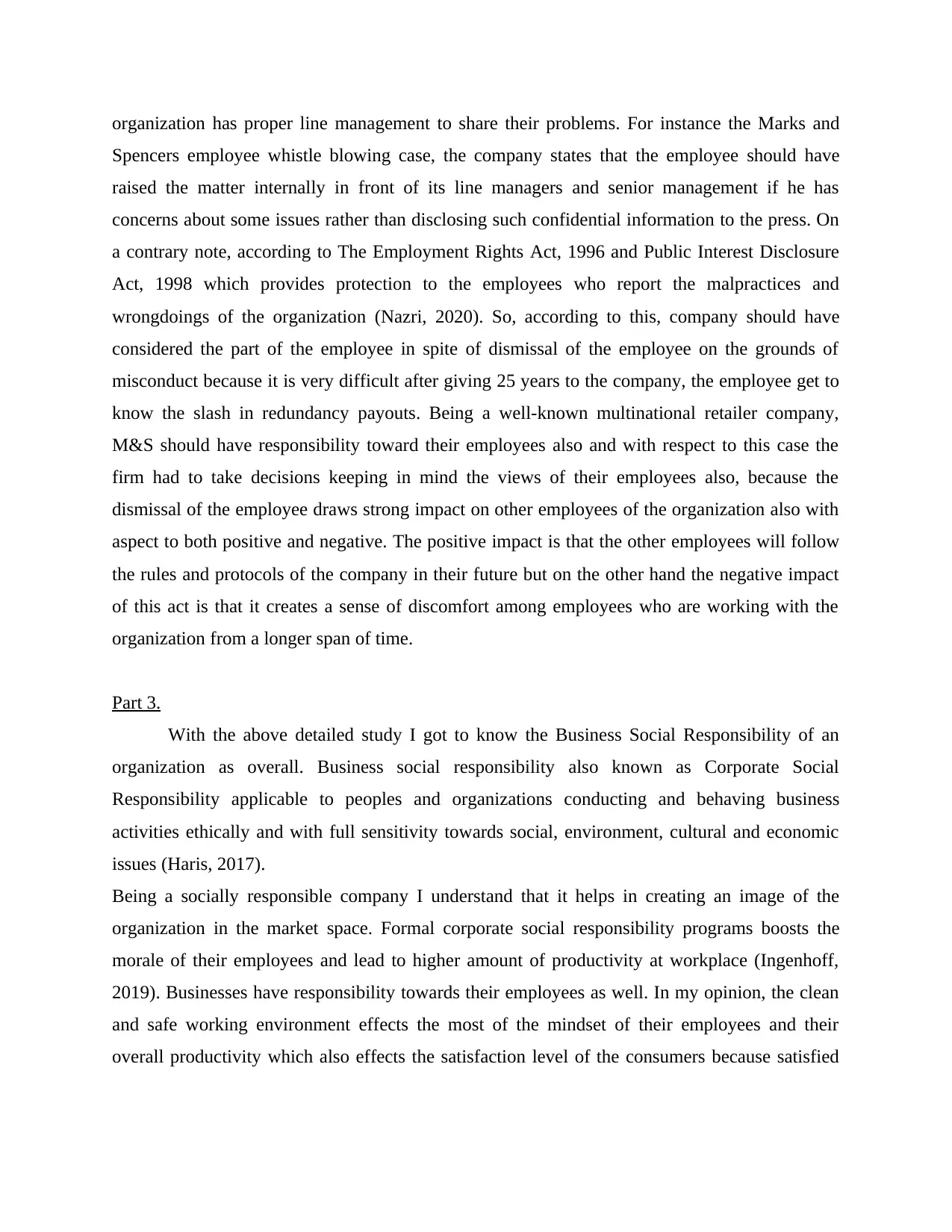
organization has proper line management to share their problems. For instance the Marks and
Spencers employee whistle blowing case, the company states that the employee should have
raised the matter internally in front of its line managers and senior management if he has
concerns about some issues rather than disclosing such confidential information to the press. On
a contrary note, according to The Employment Rights Act, 1996 and Public Interest Disclosure
Act, 1998 which provides protection to the employees who report the malpractices and
wrongdoings of the organization (Nazri, 2020). So, according to this, company should have
considered the part of the employee in spite of dismissal of the employee on the grounds of
misconduct because it is very difficult after giving 25 years to the company, the employee get to
know the slash in redundancy payouts. Being a well-known multinational retailer company,
M&S should have responsibility toward their employees also and with respect to this case the
firm had to take decisions keeping in mind the views of their employees also, because the
dismissal of the employee draws strong impact on other employees of the organization also with
aspect to both positive and negative. The positive impact is that the other employees will follow
the rules and protocols of the company in their future but on the other hand the negative impact
of this act is that it creates a sense of discomfort among employees who are working with the
organization from a longer span of time.
Part 3.
With the above detailed study I got to know the Business Social Responsibility of an
organization as overall. Business social responsibility also known as Corporate Social
Responsibility applicable to peoples and organizations conducting and behaving business
activities ethically and with full sensitivity towards social, environment, cultural and economic
issues (Haris, 2017).
Being a socially responsible company I understand that it helps in creating an image of the
organization in the market space. Formal corporate social responsibility programs boosts the
morale of their employees and lead to higher amount of productivity at workplace (Ingenhoff,
2019). Businesses have responsibility towards their employees as well. In my opinion, the clean
and safe working environment effects the most of the mindset of their employees and their
overall productivity which also effects the satisfaction level of the consumers because satisfied
Spencers employee whistle blowing case, the company states that the employee should have
raised the matter internally in front of its line managers and senior management if he has
concerns about some issues rather than disclosing such confidential information to the press. On
a contrary note, according to The Employment Rights Act, 1996 and Public Interest Disclosure
Act, 1998 which provides protection to the employees who report the malpractices and
wrongdoings of the organization (Nazri, 2020). So, according to this, company should have
considered the part of the employee in spite of dismissal of the employee on the grounds of
misconduct because it is very difficult after giving 25 years to the company, the employee get to
know the slash in redundancy payouts. Being a well-known multinational retailer company,
M&S should have responsibility toward their employees also and with respect to this case the
firm had to take decisions keeping in mind the views of their employees also, because the
dismissal of the employee draws strong impact on other employees of the organization also with
aspect to both positive and negative. The positive impact is that the other employees will follow
the rules and protocols of the company in their future but on the other hand the negative impact
of this act is that it creates a sense of discomfort among employees who are working with the
organization from a longer span of time.
Part 3.
With the above detailed study I got to know the Business Social Responsibility of an
organization as overall. Business social responsibility also known as Corporate Social
Responsibility applicable to peoples and organizations conducting and behaving business
activities ethically and with full sensitivity towards social, environment, cultural and economic
issues (Haris, 2017).
Being a socially responsible company I understand that it helps in creating an image of the
organization in the market space. Formal corporate social responsibility programs boosts the
morale of their employees and lead to higher amount of productivity at workplace (Ingenhoff,
2019). Businesses have responsibility towards their employees as well. In my opinion, the clean
and safe working environment effects the most of the mindset of their employees and their
overall productivity which also effects the satisfaction level of the consumers because satisfied
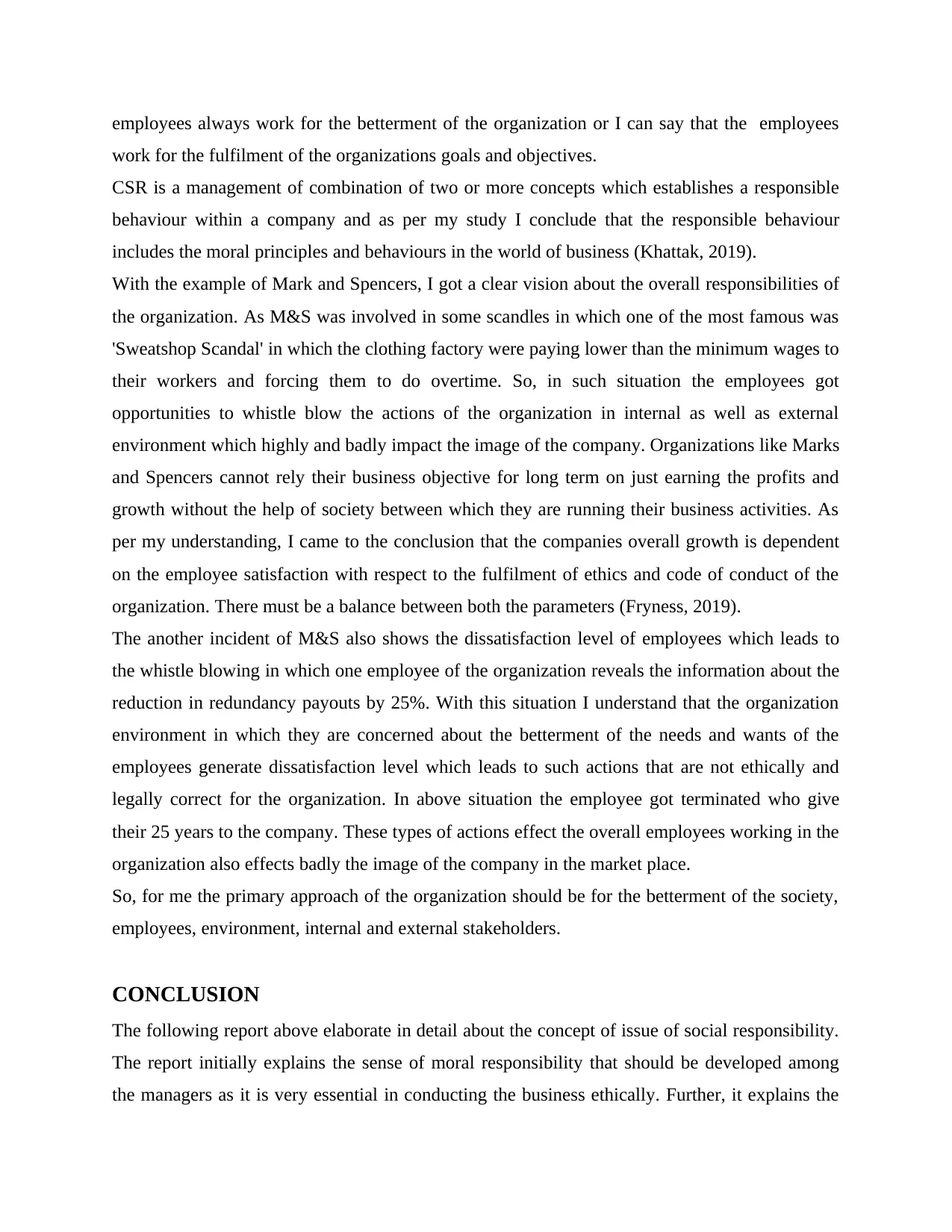
employees always work for the betterment of the organization or I can say that the employees
work for the fulfilment of the organizations goals and objectives.
CSR is a management of combination of two or more concepts which establishes a responsible
behaviour within a company and as per my study I conclude that the responsible behaviour
includes the moral principles and behaviours in the world of business (Khattak, 2019).
With the example of Mark and Spencers, I got a clear vision about the overall responsibilities of
the organization. As M&S was involved in some scandles in which one of the most famous was
'Sweatshop Scandal' in which the clothing factory were paying lower than the minimum wages to
their workers and forcing them to do overtime. So, in such situation the employees got
opportunities to whistle blow the actions of the organization in internal as well as external
environment which highly and badly impact the image of the company. Organizations like Marks
and Spencers cannot rely their business objective for long term on just earning the profits and
growth without the help of society between which they are running their business activities. As
per my understanding, I came to the conclusion that the companies overall growth is dependent
on the employee satisfaction with respect to the fulfilment of ethics and code of conduct of the
organization. There must be a balance between both the parameters (Fryness, 2019).
The another incident of M&S also shows the dissatisfaction level of employees which leads to
the whistle blowing in which one employee of the organization reveals the information about the
reduction in redundancy payouts by 25%. With this situation I understand that the organization
environment in which they are concerned about the betterment of the needs and wants of the
employees generate dissatisfaction level which leads to such actions that are not ethically and
legally correct for the organization. In above situation the employee got terminated who give
their 25 years to the company. These types of actions effect the overall employees working in the
organization also effects badly the image of the company in the market place.
So, for me the primary approach of the organization should be for the betterment of the society,
employees, environment, internal and external stakeholders.
CONCLUSION
The following report above elaborate in detail about the concept of issue of social responsibility.
The report initially explains the sense of moral responsibility that should be developed among
the managers as it is very essential in conducting the business ethically. Further, it explains the
work for the fulfilment of the organizations goals and objectives.
CSR is a management of combination of two or more concepts which establishes a responsible
behaviour within a company and as per my study I conclude that the responsible behaviour
includes the moral principles and behaviours in the world of business (Khattak, 2019).
With the example of Mark and Spencers, I got a clear vision about the overall responsibilities of
the organization. As M&S was involved in some scandles in which one of the most famous was
'Sweatshop Scandal' in which the clothing factory were paying lower than the minimum wages to
their workers and forcing them to do overtime. So, in such situation the employees got
opportunities to whistle blow the actions of the organization in internal as well as external
environment which highly and badly impact the image of the company. Organizations like Marks
and Spencers cannot rely their business objective for long term on just earning the profits and
growth without the help of society between which they are running their business activities. As
per my understanding, I came to the conclusion that the companies overall growth is dependent
on the employee satisfaction with respect to the fulfilment of ethics and code of conduct of the
organization. There must be a balance between both the parameters (Fryness, 2019).
The another incident of M&S also shows the dissatisfaction level of employees which leads to
the whistle blowing in which one employee of the organization reveals the information about the
reduction in redundancy payouts by 25%. With this situation I understand that the organization
environment in which they are concerned about the betterment of the needs and wants of the
employees generate dissatisfaction level which leads to such actions that are not ethically and
legally correct for the organization. In above situation the employee got terminated who give
their 25 years to the company. These types of actions effect the overall employees working in the
organization also effects badly the image of the company in the market place.
So, for me the primary approach of the organization should be for the betterment of the society,
employees, environment, internal and external stakeholders.
CONCLUSION
The following report above elaborate in detail about the concept of issue of social responsibility.
The report initially explains the sense of moral responsibility that should be developed among
the managers as it is very essential in conducting the business ethically. Further, it explains the
⊘ This is a preview!⊘
Do you want full access?
Subscribe today to unlock all pages.

Trusted by 1+ million students worldwide
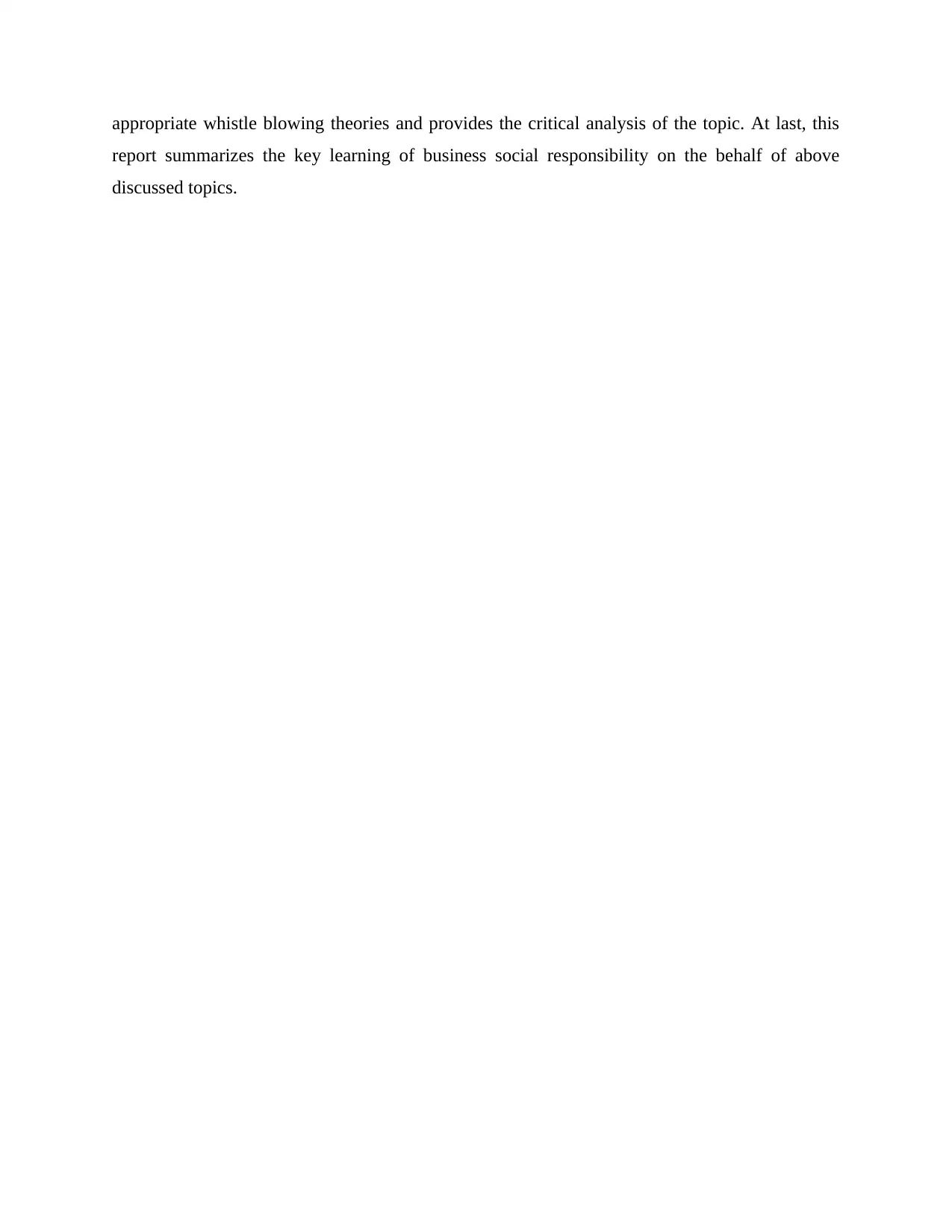
appropriate whistle blowing theories and provides the critical analysis of the topic. At last, this
report summarizes the key learning of business social responsibility on the behalf of above
discussed topics.
report summarizes the key learning of business social responsibility on the behalf of above
discussed topics.
Paraphrase This Document
Need a fresh take? Get an instant paraphrase of this document with our AI Paraphraser
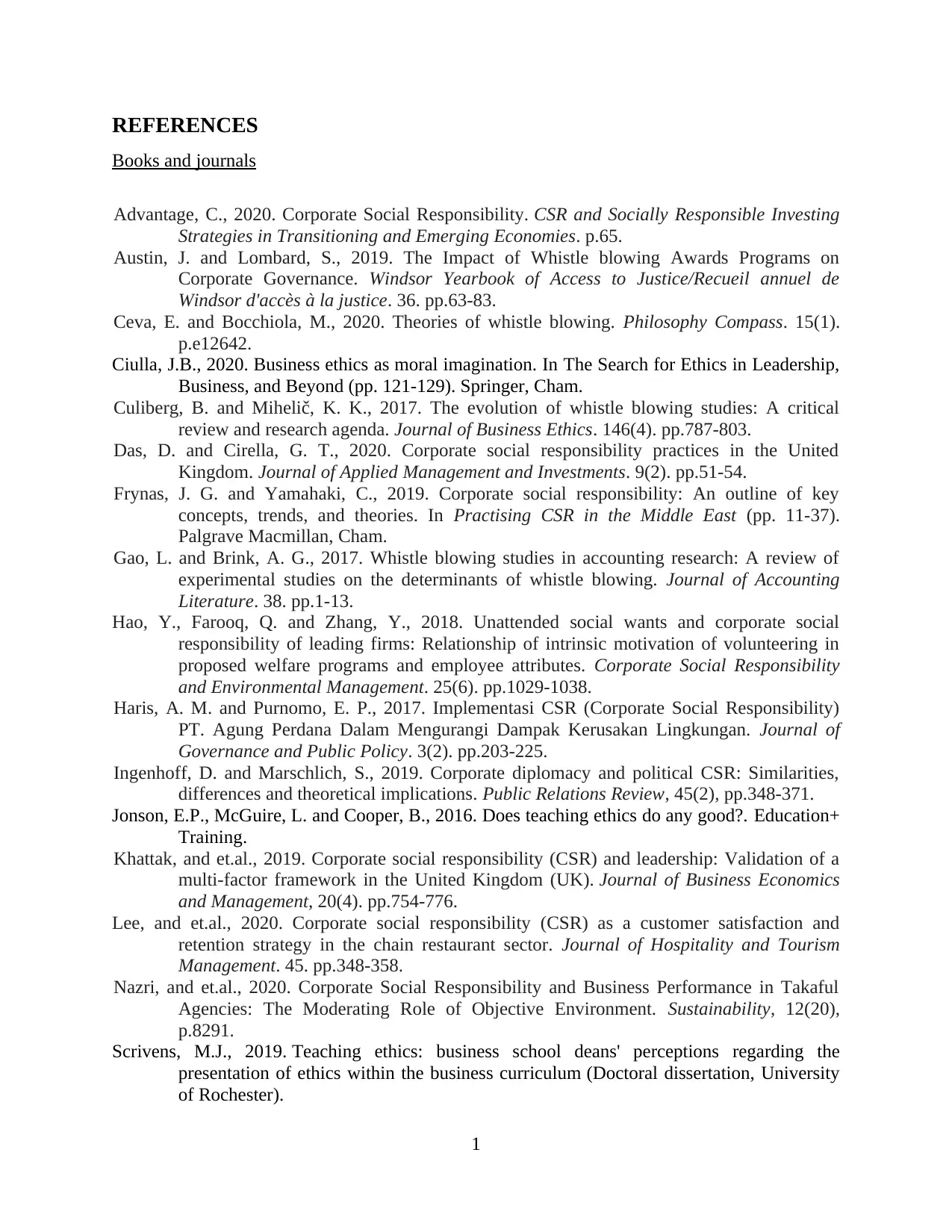
REFERENCES
Books and journals
Advantage, C., 2020. Corporate Social Responsibility. CSR and Socially Responsible Investing
Strategies in Transitioning and Emerging Economies. p.65.
Austin, J. and Lombard, S., 2019. The Impact of Whistle blowing Awards Programs on
Corporate Governance. Windsor Yearbook of Access to Justice/Recueil annuel de
Windsor d'accès à la justice. 36. pp.63-83.
Ceva, E. and Bocchiola, M., 2020. Theories of whistle blowing. Philosophy Compass. 15(1).
p.e12642.
Ciulla, J.B., 2020. Business ethics as moral imagination. In The Search for Ethics in Leadership,
Business, and Beyond (pp. 121-129). Springer, Cham.
Culiberg, B. and Mihelič, K. K., 2017. The evolution of whistle blowing studies: A critical
review and research agenda. Journal of Business Ethics. 146(4). pp.787-803.
Das, D. and Cirella, G. T., 2020. Corporate social responsibility practices in the United
Kingdom. Journal of Applied Management and Investments. 9(2). pp.51-54.
Frynas, J. G. and Yamahaki, C., 2019. Corporate social responsibility: An outline of key
concepts, trends, and theories. In Practising CSR in the Middle East (pp. 11-37).
Palgrave Macmillan, Cham.
Gao, L. and Brink, A. G., 2017. Whistle blowing studies in accounting research: A review of
experimental studies on the determinants of whistle blowing. Journal of Accounting
Literature. 38. pp.1-13.
Hao, Y., Farooq, Q. and Zhang, Y., 2018. Unattended social wants and corporate social
responsibility of leading firms: Relationship of intrinsic motivation of volunteering in
proposed welfare programs and employee attributes. Corporate Social Responsibility
and Environmental Management. 25(6). pp.1029-1038.
Haris, A. M. and Purnomo, E. P., 2017. Implementasi CSR (Corporate Social Responsibility)
PT. Agung Perdana Dalam Mengurangi Dampak Kerusakan Lingkungan. Journal of
Governance and Public Policy. 3(2). pp.203-225.
Ingenhoff, D. and Marschlich, S., 2019. Corporate diplomacy and political CSR: Similarities,
differences and theoretical implications. Public Relations Review, 45(2), pp.348-371.
Jonson, E.P., McGuire, L. and Cooper, B., 2016. Does teaching ethics do any good?. Education+
Training.
Khattak, and et.al., 2019. Corporate social responsibility (CSR) and leadership: Validation of a
multi-factor framework in the United Kingdom (UK). Journal of Business Economics
and Management, 20(4). pp.754-776.
Lee, and et.al., 2020. Corporate social responsibility (CSR) as a customer satisfaction and
retention strategy in the chain restaurant sector. Journal of Hospitality and Tourism
Management. 45. pp.348-358.
Nazri, and et.al., 2020. Corporate Social Responsibility and Business Performance in Takaful
Agencies: The Moderating Role of Objective Environment. Sustainability, 12(20),
p.8291.
Scrivens, M.J., 2019. Teaching ethics: business school deans' perceptions regarding the
presentation of ethics within the business curriculum (Doctoral dissertation, University
of Rochester).
1
Books and journals
Advantage, C., 2020. Corporate Social Responsibility. CSR and Socially Responsible Investing
Strategies in Transitioning and Emerging Economies. p.65.
Austin, J. and Lombard, S., 2019. The Impact of Whistle blowing Awards Programs on
Corporate Governance. Windsor Yearbook of Access to Justice/Recueil annuel de
Windsor d'accès à la justice. 36. pp.63-83.
Ceva, E. and Bocchiola, M., 2020. Theories of whistle blowing. Philosophy Compass. 15(1).
p.e12642.
Ciulla, J.B., 2020. Business ethics as moral imagination. In The Search for Ethics in Leadership,
Business, and Beyond (pp. 121-129). Springer, Cham.
Culiberg, B. and Mihelič, K. K., 2017. The evolution of whistle blowing studies: A critical
review and research agenda. Journal of Business Ethics. 146(4). pp.787-803.
Das, D. and Cirella, G. T., 2020. Corporate social responsibility practices in the United
Kingdom. Journal of Applied Management and Investments. 9(2). pp.51-54.
Frynas, J. G. and Yamahaki, C., 2019. Corporate social responsibility: An outline of key
concepts, trends, and theories. In Practising CSR in the Middle East (pp. 11-37).
Palgrave Macmillan, Cham.
Gao, L. and Brink, A. G., 2017. Whistle blowing studies in accounting research: A review of
experimental studies on the determinants of whistle blowing. Journal of Accounting
Literature. 38. pp.1-13.
Hao, Y., Farooq, Q. and Zhang, Y., 2018. Unattended social wants and corporate social
responsibility of leading firms: Relationship of intrinsic motivation of volunteering in
proposed welfare programs and employee attributes. Corporate Social Responsibility
and Environmental Management. 25(6). pp.1029-1038.
Haris, A. M. and Purnomo, E. P., 2017. Implementasi CSR (Corporate Social Responsibility)
PT. Agung Perdana Dalam Mengurangi Dampak Kerusakan Lingkungan. Journal of
Governance and Public Policy. 3(2). pp.203-225.
Ingenhoff, D. and Marschlich, S., 2019. Corporate diplomacy and political CSR: Similarities,
differences and theoretical implications. Public Relations Review, 45(2), pp.348-371.
Jonson, E.P., McGuire, L. and Cooper, B., 2016. Does teaching ethics do any good?. Education+
Training.
Khattak, and et.al., 2019. Corporate social responsibility (CSR) and leadership: Validation of a
multi-factor framework in the United Kingdom (UK). Journal of Business Economics
and Management, 20(4). pp.754-776.
Lee, and et.al., 2020. Corporate social responsibility (CSR) as a customer satisfaction and
retention strategy in the chain restaurant sector. Journal of Hospitality and Tourism
Management. 45. pp.348-358.
Nazri, and et.al., 2020. Corporate Social Responsibility and Business Performance in Takaful
Agencies: The Moderating Role of Objective Environment. Sustainability, 12(20),
p.8291.
Scrivens, M.J., 2019. Teaching ethics: business school deans' perceptions regarding the
presentation of ethics within the business curriculum (Doctoral dissertation, University
of Rochester).
1

Tench, R. and Topić, M., 2017. Evaluating CSR, Sustainability, and Sourcing within the UK
Supermarket Industry. CSR, Sustainability, and Leadership. 5. p.100.
van Driel, H., 2018. Financial fraud, scandals, and regulation: A conceptual framework and
literature review. Business History.
2
Supermarket Industry. CSR, Sustainability, and Leadership. 5. p.100.
van Driel, H., 2018. Financial fraud, scandals, and regulation: A conceptual framework and
literature review. Business History.
2
⊘ This is a preview!⊘
Do you want full access?
Subscribe today to unlock all pages.

Trusted by 1+ million students worldwide
1 out of 12
Related Documents
Your All-in-One AI-Powered Toolkit for Academic Success.
+13062052269
info@desklib.com
Available 24*7 on WhatsApp / Email
![[object Object]](/_next/static/media/star-bottom.7253800d.svg)
Unlock your academic potential
Copyright © 2020–2026 A2Z Services. All Rights Reserved. Developed and managed by ZUCOL.




